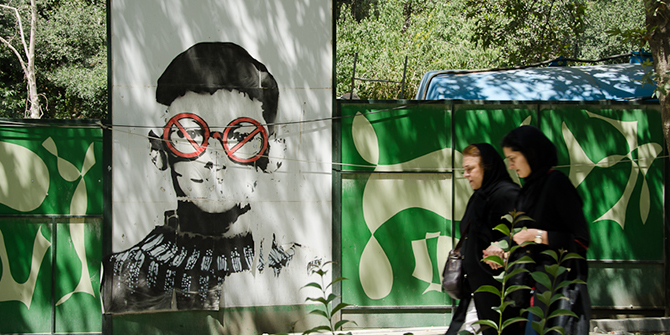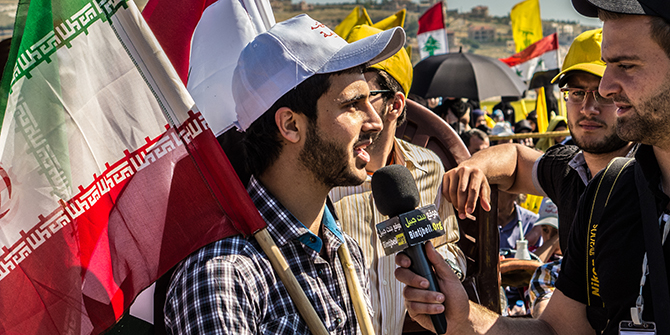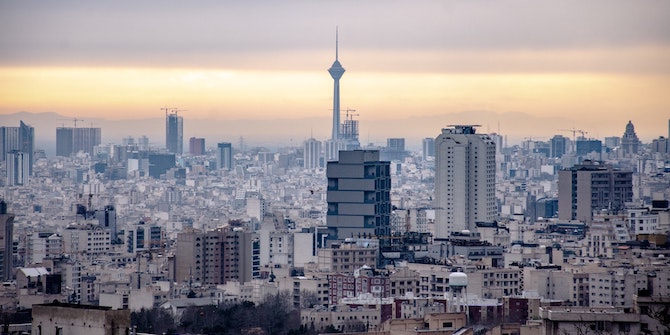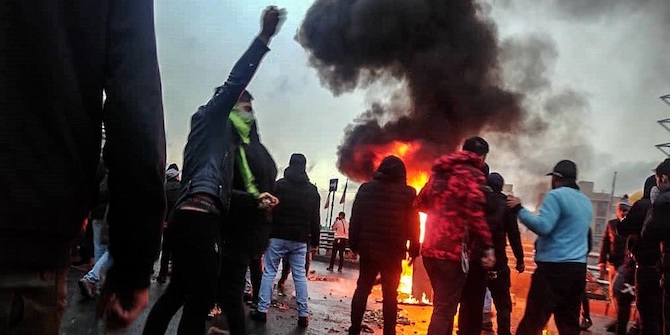by Adam Weinstein

With the achievement of the Joint Comprehensive Plan of Action (JCPOA) between Iran and the P5+1, the power of diplomacy is being celebrated worldwide. However, behind the applause for successful negotiations some policymakers are giving credence to the long history of US sanctions against Iran for their ability to bring the Islamic Republic to the negotiating table. As Saam Borhani recently wrote, ‘proponents of the United States using sanctions as a tool of statecraft are in a triumphant mode’.
But history repeats itself and this is not the first time defenders of sanctions have jumped to conclude their efficacy. After the invasion of Iraq, as the proponents of the existence of Weapons of Mass Destruction (WMDs) were backed further into a corner, they retreated to the logic that if WMDs were in fact not present it was only because sanctions had prevented them. Rather than confuse correlation for causation it would behoove US policymakers to consider the real motives and effects of sanctions in light of recent history. Unilateral sanctions by the US must be abandoned altogether because they prove ineffective and the US’ role as ring-leader of multilateral sanctions must also be reassessed because it places the nation and American businesses at a serious disadvantage.
Awarding sanctions the credit for pushing Iran to accept inspection of its facilities and limit the scope of its nuclear program assumes that the goal of sanctions is not something more aggressive. It may be an academic faux pas to suggest Western sanctions are designed to foment regime change rather than increase human rights or prevent the proliferation of nuclear weapons. However, a quick glance at the list of sanctioned countries by the US Treasury Department’s Office of Foreign Assets Control (OFAC) which includes places like Iran, Cuba, Sudan, Zimbabwe, and formerly Libya reveals a common attribute among sanctioned countries — a regime the US publicly denounces as illegitimate. Recent sanctions against Russia are one of the few deviations from this pattern. In the case of sanctions against the late Saddam Hussein’s regime, it was clear that the primary goal was to foment internal unrest leading to regime change and by the time President Bush Jr. entered the White House no effort was made to conceal this intention.
US sanctions were first implemented in Iran in response to the hostage crisis, then bolstered under President Clinton with the passage of the 1996 Iran and Libya Sanctions Act (ILSA) despite the lack of a legal basis for jurisdiction to regulate third country trade. These sanctions were reinforced by President Obama in response to Iran’s nuclear program. There is no doubt that three decades of both unilateral and multilateral sanctions have impacted Iran. Even Supreme Leader Ayatollah Ali Khamenei conceded to this in remarks to laborers back in April of 2015 when he said ‘I do not deny that these unjust sanctions that the enemies of the Iranian nation and the enemies of the revolution have imposed on the Iranian nation are effective; undoubtedly they are effective’.
In portraying the sanctions as an affront to the national identity of the Islamic Republic —the Revolution — Khamenei rallied his base. Furthermore, the response of the Iranian government is not merely limited to rhetoric. They have built a highly competent workforce within a self-contained economy. In other words, the moment sanctions take effect the incentive to change policy begins to half-life as adaptation negates any will to succumb to the demands of the sanctioning country.

But what about human rights? It is difficult to believe human rights violations are anything but a pretext for political sanctions because most studies and common sense reveal they worsen human rights. The global community needs to ask itself whether the focus of sanctions are on human rights abuses themselves, or whether the qualifier is who is committing those abuses and even more importantly—why. Consider that when Saddam Hussein invaded Kuwait the UN Security Council passed a resolution enacting sanctions on Iraq. Yet Saddam Hussein was free to aggressively invade Iran a decade earlier using weapons universally condemned as inhumane. The recent case of Saudi teenager Ali Muhammad Al-Nimr who is sentenced to death and crucifixion for participating in protests is another example of countless human rights abuses committed by unsanctioned US allies in the region.
This paradigm of inconsistent sanction application is observed by regional actors and factored into their response to threats of sanctions. Perhaps the biggest danger of implementing unilateral sanctions or even a trade embargo lies in the risk of countries like Iran adopting a view that implementation has no relationship to specific policies but is rooted in their national identity. In this case governments will focus on managing sanctions instead of compromising to avoid them. After decades of sanctions Tehran can accurately calculate what domestic consequences future sanctions will bring which further reduces their potency. If the elite of a government can shield themselves from the effects of sanctions and perhaps even use them to reinforce their power, then favorable policy changes will only occur if the interests of the imposing country converge with the receiving one.
The claim that Iran is the foremost sponsor of terrorism and a destabilising force in the region is also asserted as a justification for continued sanctions. Of course when US politicians speak of Iranian sponsored terrorism, they are mostly referring to Hezbollah. When it comes to terrorism an inconsistent and thus ineffective US response is applied. For example, Saudi Arabia and Qatar allegedly funded such unsavory groups as Liwa al-Tawhid, Ahrar al-Sham, and ultimately al-Nusra in Syria with little US outcry. Nevertheless, Hezbollah remains in the crosshairs of US anti-terror rhetoric. There are inextricable links between the largest Shiite country and the world’s Shiite movements. Musa al-Sadr, one of Hezbollah’s ideological fathers was himself from Qom, Iran. However, Hezbollah was not born of the Islamic Republic but developed alongside it. In fact, Musa Sadr and the Shiite AMAL movement (Arabic acronym for Lebanese Resistance Brigades) predated the Islamic Revolution. Ever since Hezbollah adopted a policy of infitah (or openness) it has become entrenched in Lebanese politics despite divisions. This rise to de facto political hegemony within Lebanon occurred amidst sanctions against Iran.
It was also foreseeable that the US de-Baathification of Iraq would lead to Iranian influence. The notion that Iran should not take an interest in Iraq is as unrealistic as suggesting the US has no influence in Mexico. While Iranian figures openly tour Iraqi battlefields certain US allies engage in more furtive efforts at destabilisation. The horrific bombing of a Kuwaiti Shiite mosque on 26 June 2015 was not a unique occurrence simply because ISIS claimed responsibility. The Saudi government promotes hatred towards Shiites until the match of sectarian violence is lit and then allows the momentum of hate take its course. Only after the blast, do Saudi officials speak out against terror. Meanwhile, the Iranian military and Hezbollah have played a pivotal role in slowing the advance of ISIS into Iraq and even Lebanon. The US finally recognised this reality when it recently invited Iran through Russia to participate in Syria talks — much to the dismay of the Saudis. This is the kind of realistic, if late, policy that is needed at this juncture in US-Iranian relations.
Unilateral sanctions and trade embargoes must be abandoned by the US altogether because their inconsistent application undermines their very premise and most importantly—they do not work. However, the US should also seriously reflect on its role as ring-leader of multilateral sanctions against Iran. While the US was busy sending a letter to the UN on behalf of France, Germany, and the UK, in response to the alleged violations of Iran’s recent missile test, the latter countries were setting up trade offices in Tehran. The limited success of sanctions should not be taken to mean the whole system is worthy of being continued. In doing so the US risks implementing a sort of reverse sanctions in which our own companies are excluded from the market and our foreign policy becomes disfavoured.
 Adam Weinstein is a third year law student and J.D. candidate at the Temple Beasley School of Law in Philadelphia, Pennsylvania where he focuses on developmental and international law. His interests include the relationship of US foreign policy to development and security within the Middle East. He tweets at @AdamNoahWho and can also be reached at adam.weinstein@temple.edu.
Adam Weinstein is a third year law student and J.D. candidate at the Temple Beasley School of Law in Philadelphia, Pennsylvania where he focuses on developmental and international law. His interests include the relationship of US foreign policy to development and security within the Middle East. He tweets at @AdamNoahWho and can also be reached at adam.weinstein@temple.edu.






